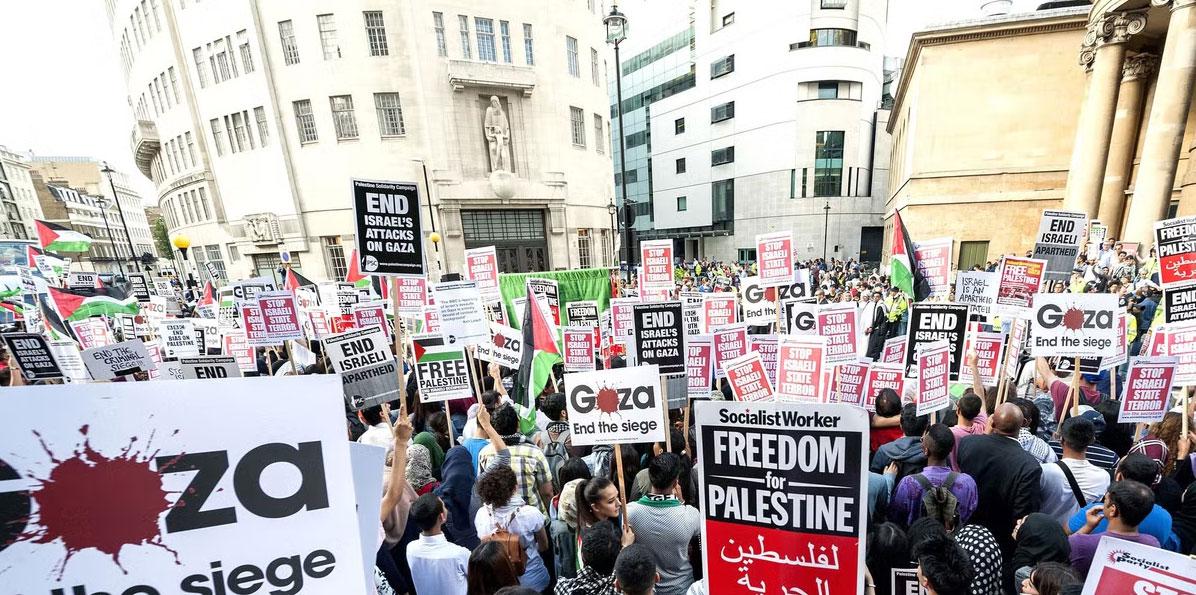Africa-Press – Lesotho. If we take a cursory look at the way that the world has evolved in modern times, especially since the age of industrialization set in a couple of centuries ago, we will no doubt have to acknowledge that science and technology have brought about drastic changes in our lives through improvements in the material conditions of living.
Gadgets that have allowed us to spend less time on routine household chores like cooking, cleaning, and washing have given us more leisure time – for which advancing technology and man’s creativity have also made available all kinds of gimmicks designed to enhance pleasure, to tickle and titillate as well.
Hundreds protest against ‘BBC pro-Israel bias’ of Gaza coverage in cities across the UK.
Pic – The Independent So far so ‘good’. In parallel, though, there has been competition among countries to access resources from wherever they are available so as to meet the increasing demands and stimulate appetites of rising numbers of people the world over.
Even if this competition has not always been healthy, nevertheless overall practically all countries have gradually organized themselves politically, economically, and socially to benefit from all the advances that have kept taking place.
The political/economic arrangements that evolved and were eventually adopted by different countries were capitalism, socialism, Marxism/communism, autocracies and dictatorships, and some constitutional monarchies.
Post-World War II the developed world found itself divided into two blocs led by two superpowers, the United States of America, and the United Soviet Socialist Republic, pitting the capitalist mode of governance against the communist model.
The former was deemed to be the epitome of democracy in contrast to the latter which was believed to be less democratic. Most remaining countries opted to follow the socialist/capitalist model of democracy.
In the 1990s this led noted historian Francis Fukuyama to advocate that liberal democracy was the ideal model for a country’s development and thus represented ‘The End of History’ – the title of the book he wrote on the subject.
Emerging faultlines
But then social and religious faultlines began to crack open the facades and fabrics of the most lauded western democracies, as their capacities to manage these potentially divisive tendencies through fundamentally two models – the ‘melting pot’ one of the US and the ‘multicultural’ one with the UK in the forefront – fell short of their expectations.
This has impacted their politics as well, with liberal democracy in Europe and the US taking a hard knock, especially in the wake of the financial crisis of 2008/09, if one is to go by the profusion of articles about the ‘crisis of democracy’ that have been published since, and that peaked during the elections that brought Donald Trump to power.
The flow of such articles has not ceased. Embroilment in wars and conflicts in Africa, the Middle east and Asia has further complicated matters, with migrants massively flooding into Europe in particular, causing further social dislocations, with increasingly frequent rioting and attacks against the native citizenry.
These have been accompanied by open threats to radically alter the demographics of several European countries and eventually take over and rule them according to archaic models. The latest stressor is the Ukrainian war which is now in its second year and unending.
Despite its being the least bad of political systems, according to British politician Winston Churchill, democracy with its weaknesses is nevertheless the deemed best way to run a country. Our own model of democracy is the Westminsterian one inherited from the UK, looked up to as a robust representation of that system.
One would have thought, therefore, that people in responsible positions and established organizations in the UK would hail both the greatest and the largest democracies in the world by their own standards, namely the US and India respectively.
For More News And Analysis About Lesotho Follow Africa-Press






